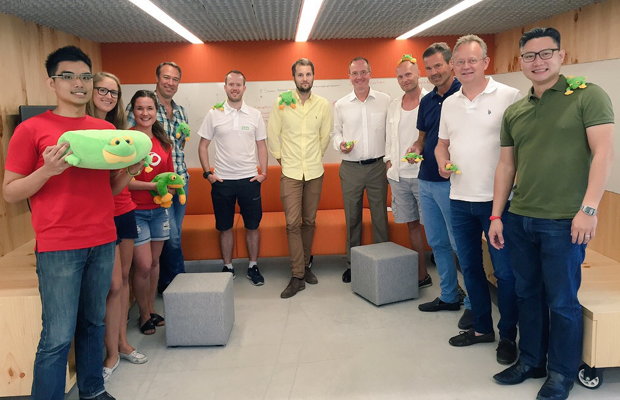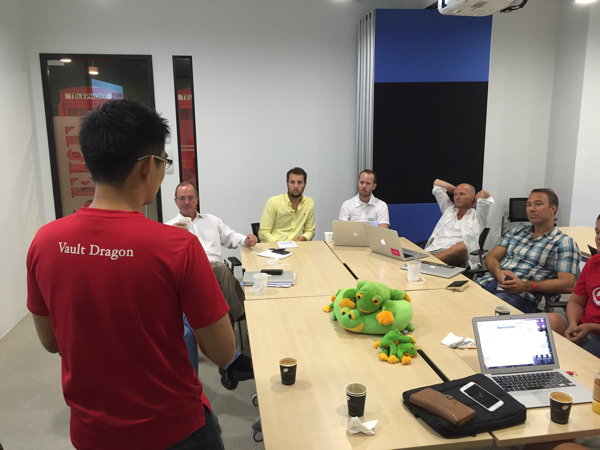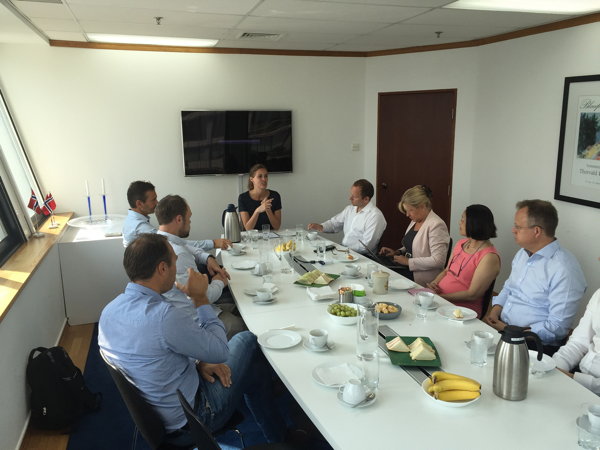The Norwegian government agency Innovation Norway has for the second time arranged TINC Asia, a Tech Incubator programme in Singapore in which six selected Norwegian start-ups participated (during 17 August to 4 September). Innovation Norway has partnered up with Joyful Frog Digital Incubator(jfdi.asia)
TINC Asia helps the start-ups align and connect their businesses with Asian markets, for distribution and development of future products and services. This three-week mentoring experience is a concrete part of Innovation Norway’s support to companies in developing their competitive advantage and to enhance innovation.
Combining local industry knowledge and international networks with the business ideas and the motivation of entrepreneurs, builds the foundation for new successful businesses.

“Norway is similar to Singapore in the sense that the home markets are small – this means that high-potential start-ups need to focus on international expansion early,” said Innovation Norway regional director Torunn Aass Taralrud.
“TINC Asia offers access to some of the best local start-up resources in Asia and provides a unique learning experience for these companies,” she claimed.
Consisting in a community of people who practice, finance and teach innovation, JFDI delivers innovation for corporations, governments and investment funds. They run ‘JFDI Accelerate’ – the longest-running and most successful seed accelerator program in South East Asia.
They also offers the online pre-accelerator programme ‘JFDI Discover’ that aims to give confidence to first-time entrepreneurs or nascent teams who are exploring an idea, launching a prototype, or preparing to raise funds. Their programmes for business start-ups and professionals, lead people to think and act entrepreneurially by helping them to engineer innovative businesses around their ideas.
Biogrid, offering vertical farming in urban areas; and Kaizit, which has a specialised IT solution promoting efficiency and quality of shipping dry-docking, were two of the selected start-up teams.
“Participating in a programme like this really helps us understand the business culture in the region; it practically kicks doors open. And the mentors at JFDI are really helpful, they help us crack the social codes, help us navigate bureaucracy, and even locate the most exotic foods in Singapore,” said August Flatby of Biogrid AS, while attending in Singapore. “If we had to learn everything the slow way, then I believe it would have taken us months to build up sufficient confidence to build a business here.“
Participating companies in TINC Asia can gain greater insight and familiarity with Asian business, culture, preferences and expectations, to enable faster growth into the region, with lesser risk.
Founded in 2015 and including a grant from Innovation Norway, Biogrid’s intelligent growth modules are primarily targeted at commercial urban farmers who want to produce healthy, nutricious and tasty food in vertical farms in urban areas.
“Biogrid was chosen to participate because we develop enabling technologies for indoor agriculture. This kind of technology is a good fit for nations like Singapore that wants to achieve more food self-reliance by building urban farms, vertical farms and plant factories,” explained August who finds Singapore to be an incredibly interesting place.
“It is fine-tuned in every detail, run as a very efficient, large, company. As a part of Singapore’s drive toward becoming an even smarter nation, there is a real push toward using sensor technologies and data intelligence in novel ways. We believe that Biogrid’s technology fits very well into this vision, as our system harnesses these technologies in order to increase crop yields and to ensure predictable harvests in urban farms.”
“Singapore is also interesting because of its close proximity to China, which is where we are planning to do our hardware manufacturing,” he continued.
The TINC Asia programme is quite well known within Norway and especially the Silicon Valley programmes that have been running for several years.

“I participated in a similar programme with Innovation Norway back in 2013, where my company was chosen to participate in a GET (Global Entrepreneurship Training) program at the highly rated Babson College in Boston, US. Since then I’ve been in the loop and got the opportunity to apply for this programme, Stig Linna, CEO at Kaizit as.
“By making use of the large network and the experience from many earlier start-ups here, we believe that we can accelerate much faster this way,” he replied about fast-tracking the company’s growth in Asia.
The TINC Asia 2015 participants began with a three-day briefing session in Oslo in June after which participants researched target markets in Asia remotely and prepared to meet with potential business partners while in Singapore.
After two meetings the first week Kaizit actually got very strong interest from the two first ship managers that they met to participate in a pilot phase of testing out their new product planning and execution of the repair/dry-docking process for vessels.
“We aim to streamline the process in order to reduce cost, increase control and transparency and become less people dependent.”
In its preparation, researching the Asian market and preparing to meet potential business partners in Singapore, Kaizit found that they could offer two solutions aimed to help improve shipping companies’ operations; one being an existing solution that makes shipping companies improve their sales.
“During the demanding market that many experiences today – we actually find that the willingness to invest in initiatives that can increase sales is very interesting,” said Stig Linna.
Coming from Norway Kaizit naturally has a strong position within the shipping industry related to its home market, he pointed out. But Singapore and the surrounding region is of great interest for the expansion.
“We have seen that Singapore is the main hub for shipping companies, so we are testing out if it might be an opportunity here to find innovative companies that are willing to try new ways of work in order to improve. We have already established a local representative here and will scale based on the market demand that we experience.”
Biogrid also had fruitful meetings upon arriving to Singapore.
“As soon as we arrived in Singapore and starting networking here, we got acquainted with several key people within our area of business, as well as potential business partners and investors. People in Singapore are genuinely interested in networking, and quite often we’re told: ‘Oh you should see so-and-so who is an expert in that field’, and the like. In general I’d say that people here are really good at making referrals, and seem interested in helping in any way they can,” thought August Flatby.
A lot of information made available on the Singaporean Government’s website meant that Biogrid could research a lot there, prior to departing from Oslo.
“We arranged a meeting with the Agri-food and Veterinary Authority (AVA) of Singapore upon arrival, and they helped us learn more about Singapore’s efforts towards building indoor and vertical farms, and they even arranged with us to meet researchers at a local university within our field of technology.”
“Biogrid is committed to solving real pain points for the urban farmer. So to get a better understanding of which those pain points are, we seek out real life urban farms in the local community and interview the operators of those farms. “
The 3-week programme in Singapore offers a unique opportunity to test one’s business concepts towards the Asian market, gain invaluable feedback and get exposure to a broad business network.
Participants in the programme receive strategic guidance for global expansion, delivered by mentors on an individualised basis for each company, according to JFDI.
The participants had the opportunity to connect with the local community every day, working from BASH, which is part of Singapore’s tech cluster for six months after the programme, the teams can also use the JFDI.Asia facilities to follow through on all connections they have made.
August described the facilities: “BASH is a co-working space for start-ups, located in a renovated old factory building in the one-north business area. I like the atmosphere here, people from all sorts of start-ups are doing their things, and of course there are the mandatory table tennis and foosball tables. A local bank pays a barista to feed us with muffins and wicked, strong coffee drinks all day; definitely a plus for cash-starved start-ups.”

“The language, the business culture, the friendliness and courtesy of Singaporeans; all those factors contribute to making Singapore the perfect Asia office for Biogrid,” he thought about Singapore as a hub.
“I find BASH as a modern and practical setup for making new businesses both test out their potential and also help them get funding. They also provide most of practical arrangements in order to establish the business, including the office facilities needed. The most important thing, though, is access to knowledge and networks that seems to flow easily here,” thought Stig Linna of Kaizit. “It’s an amazing place to be here at the BASH community. We have the opportunity to talk to a lot of different people with many interesting specialities and the JFDI team is very good!”
“So far we have met a lot of energetic entrepreneurs that are aiming for success. It seems like they come from a lot of different countries and nationalities,” he commented on the business network and entrepreneurship in Singapore.
August Flatby gave a positive assessment as well: “There seems to be a constant stream of events where entrepreneurs can hobnob with investors and potential customers. We’ve attended a couple of events already and our impression is that the attendees are a mix of Singaporean nationals, expats, and foreigners.”

